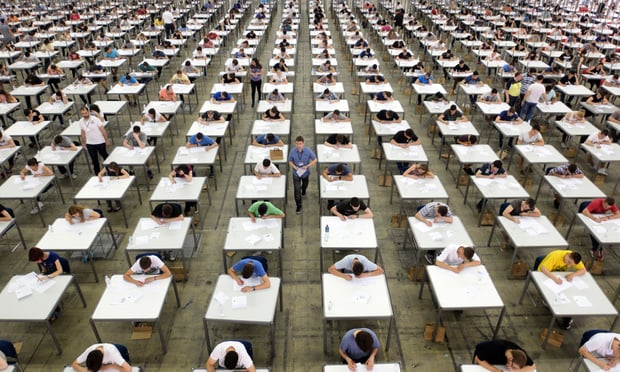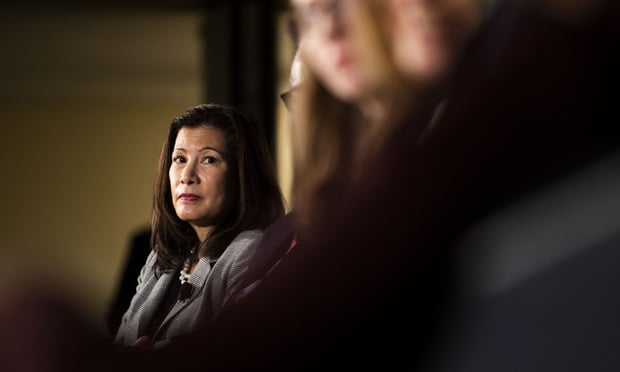Lower Bar Exam Passing Score Retroactively, Law Deans and Students Urge
Nineteen deans submitted a letter to the high court Thursday night asking that the "cut" score of 139, lowered by the Supreme Court from 144 last week, extend to graduates who sat for the February 2020 exam.
July 24, 2020 at 04:34 PM
4 minute read
 Students in exaimination hall.
Students in exaimination hall.
Taking two different approaches with the same goal, California law school deans and more than 100 alumni have asked the state Supreme Court to make the newly lowered passing score on the bar exam retroactive.
Nineteen deans submitted a letter to the high court Thursday night asking that the "cut" score of 139, lowered by the Supreme Court from 144 last week, extend to graduates who sat for the February 2020 exam. The pass rate for that test sunk to a historic low of 26.8%.
The deans, representing ABA-accredited schools in California, say they all know students who scored somewhere between 139 and just under 144 and "but for the moment" failed the February test.
"Yet these students are being double-penalized, both by the score not applying to the February exam and by the fact that they, and only they, will have achieved that now-passing score and yet must wait several additional months beyond the usual timing of the regularly scheduled exam for a new exam and that exam's results," the deans wrote.
The retroactive change would mean an additional 376 test-takers passed, according to the state bar.
In a separate petition, the law school graduates asked the court to make the score retroactive to anyone who sat for the exam between July 2017 and February 2020. July 2017 was the first time the exam was administered over two days instead of three.
"This was a substantial change in the exams being administered and in theory, all subsequent exams, all things considered, would be on equal footing," the alumni wrote.
Supreme Court officials were trying to determine Friday whether the petition, submitted on line-numbered legal paper, was intended as a formal filing with the court or a more informal request. It does not state a specific claim.
The court did not have an immediate response to both groups' correspondence. Chief Justice Tani Cantil-Sakauye and Associate Justice Ming Chin were attending a Judicial Council meeting Friday morning.
 Tani Cantil-Sakauye, chief justice of California. Credit: Diego M. Radzinschi / ALM
Tani Cantil-Sakauye, chief justice of California. Credit: Diego M. Radzinschi / ALMThe court's July 16 decision to permanently roll back the cut score stunned law school deans, lawmakers and students who had pleaded with the justices for years to lower what was then the second-highest-in-the-nation passing figure. The court did not explain its decision other than to cite a study that showed a 139 score on the exam is a statistically sound deviation from 144.
Lawmakers, citing the exam's low pass rate and the resulting disparate impact on minorities trying to join the bar, had pressed the court in June to lower the score to just below 139.
The deans' letter was shepherded by UC Hastings professor Richard Zitrin, an expert in legal ethics.
"I'm deeply concerned by the fundamental unfairness to students of color, including some known to me, who scored over 140 on the February 2020 bar and must now take the exam once again," Zitrin said in a statement published in a UC Hastings statement on the letter.
Read more:
California Sets Online Bar Exam for October, Permanently Lowers Passing Score
Law School Grad: California Bar Exam Decision Is a 'Hurtful Half-Measure'
It's Time to Replace the California Bar Exam
How Law Schools Fared on the February 2020 Bar Exam
UCLA's Mnookin on Bar Exam's Future and Virus-Era Challenges for New Grads
California Bar Exam Pass Rates Drop to All-Time Low 26.8% on February Test
This content has been archived. It is available through our partners, LexisNexis® and Bloomberg Law.
To view this content, please continue to their sites.
Not a Lexis Subscriber?
Subscribe Now
Not a Bloomberg Law Subscriber?
Subscribe Now
NOT FOR REPRINT
© 2025 ALM Global, LLC, All Rights Reserved. Request academic re-use from www.copyright.com. All other uses, submit a request to [email protected]. For more information visit Asset & Logo Licensing.
You Might Like
View All
LSAT Administrator Sues to Block AI Tutor From Using ‘Famous, Distinctive’ Test Prep Materials
3 minute read
Some Elite Universities Favor Wealthy Students in Admissions Decisions, Lawsuit Alleges
5 minute read
How Uncertainty in College Athletics Compensation Could Drive Lawsuits in 2025
Trending Stories
Who Got The Work
Michael G. Bongiorno, Andrew Scott Dulberg and Elizabeth E. Driscoll from Wilmer Cutler Pickering Hale and Dorr have stepped in to represent Symbotic Inc., an A.I.-enabled technology platform that focuses on increasing supply chain efficiency, and other defendants in a pending shareholder derivative lawsuit. The case, filed Oct. 2 in Massachusetts District Court by the Brown Law Firm on behalf of Stephen Austen, accuses certain officers and directors of misleading investors in regard to Symbotic's potential for margin growth by failing to disclose that the company was not equipped to timely deploy its systems or manage expenses through project delays. The case, assigned to U.S. District Judge Nathaniel M. Gorton, is 1:24-cv-12522, Austen v. Cohen et al.
Who Got The Work
Edmund Polubinski and Marie Killmond of Davis Polk & Wardwell have entered appearances for data platform software development company MongoDB and other defendants in a pending shareholder derivative lawsuit. The action, filed Oct. 7 in New York Southern District Court by the Brown Law Firm, accuses the company's directors and/or officers of falsely expressing confidence in the company’s restructuring of its sales incentive plan and downplaying the severity of decreases in its upfront commitments. The case is 1:24-cv-07594, Roy v. Ittycheria et al.
Who Got The Work
Amy O. Bruchs and Kurt F. Ellison of Michael Best & Friedrich have entered appearances for Epic Systems Corp. in a pending employment discrimination lawsuit. The suit was filed Sept. 7 in Wisconsin Western District Court by Levine Eisberner LLC and Siri & Glimstad on behalf of a project manager who claims that he was wrongfully terminated after applying for a religious exemption to the defendant's COVID-19 vaccine mandate. The case, assigned to U.S. Magistrate Judge Anita Marie Boor, is 3:24-cv-00630, Secker, Nathan v. Epic Systems Corporation.
Who Got The Work
David X. Sullivan, Thomas J. Finn and Gregory A. Hall from McCarter & English have entered appearances for Sunrun Installation Services in a pending civil rights lawsuit. The complaint was filed Sept. 4 in Connecticut District Court by attorney Robert M. Berke on behalf of former employee George Edward Steins, who was arrested and charged with employing an unregistered home improvement salesperson. The complaint alleges that had Sunrun informed the Connecticut Department of Consumer Protection that the plaintiff's employment had ended in 2017 and that he no longer held Sunrun's home improvement contractor license, he would not have been hit with charges, which were dismissed in May 2024. The case, assigned to U.S. District Judge Jeffrey A. Meyer, is 3:24-cv-01423, Steins v. Sunrun, Inc. et al.
Who Got The Work
Greenberg Traurig shareholder Joshua L. Raskin has entered an appearance for boohoo.com UK Ltd. in a pending patent infringement lawsuit. The suit, filed Sept. 3 in Texas Eastern District Court by Rozier Hardt McDonough on behalf of Alto Dynamics, asserts five patents related to an online shopping platform. The case, assigned to U.S. District Judge Rodney Gilstrap, is 2:24-cv-00719, Alto Dynamics, LLC v. boohoo.com UK Limited.
Featured Firms
Law Offices of Gary Martin Hays & Associates, P.C.
(470) 294-1674
Law Offices of Mark E. Salomone
(857) 444-6468
Smith & Hassler
(713) 739-1250







